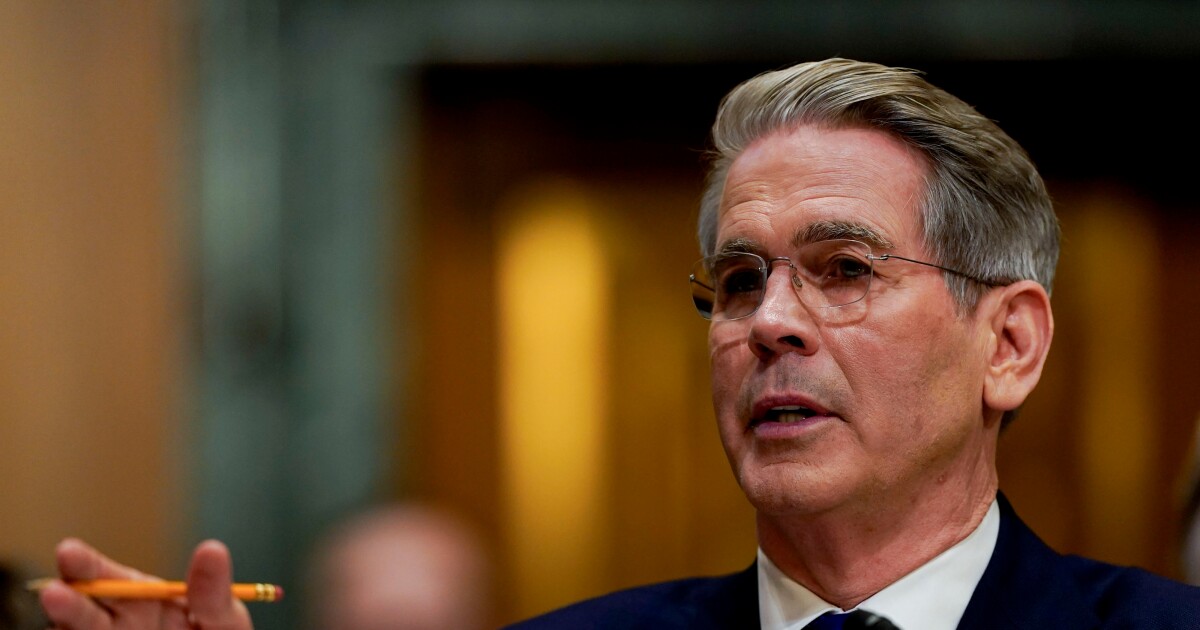Treasury Secretary nominee Scott Bessent warned that the U.S. faces an economic crisis that will hammer middle- and working-class people if the 2017 Republican tax cuts aren’t extended when a swath of them expire at the end of this year.
“This is the single most important economic issue of the day — this is pass/fail,” Bessent said in answering questions at his Senate Finance Committee confirmation hearing Thursday.
In a wide-ranging series of questions during the hours-long session, Bessent, 62, also said that the federal government “is not going to default” on its debt under his watch and that he respected the Federal Reserve’s independence over monetary policy. Further, he indicated support for expanded sanctions on Russian oil companies and blasted China for attempting to export its way out of a deep domestic economic slump.
With his comments on taxes, Bessent drew an immediate contrast with outgoing Treasury Secretary Janet Yellen, who said on Wednesday that policies including a full extension of the 2017 cuts enacted under Donald Trump “could undermine our country’s strength, from the resilience of the Treasury market to the value of the dollar, even provoking a debt crisis in the future.”
Trump’s pick for the Treasury, a veteran hedge fund investor, said that “if we do not fix these tax cuts, if we do not renew and extend, we will be facing an economic calamity. And as always with financial instability, that falls on the middle-class people.”
Spending cuts
In his prepared remarks, Bessent also emphasized the importance of addressing the budget deficit, saying the U.S. “must work to get our fiscal house in order” by adjusting domestic discretionary spending. He said that discretionary spending — outlays aside from entitlements including Social Security and Medicare — had soared by an “astonishing 40% over the past four years.”
Bessent underscored that the popular entitlement programs for older Americans aren’t going to end up on the chopping board. “I want to emphasize that President Trump has said that Social Security and Medicare will not be touched,” he said.
“One of the tragedies of this blowout in the budget deficit is that we have to get our short-term house in order,” Bessent added.
But Bessent didn’t specify what areas of spending he’d support cutting, and refused to be nailed down on particular programs. Asked, for example, if he would recommend cutting Medicaid — a federal health program for lower-income households — he said that “it’s the business of Congress to do the budget. And I am in favor of empowering states and I believe that for some states that will be an increase, for some states that will be a decrease.”
Bessent also declined specifically to endorse Democratic Senator Elizabeth Warren’s call to eliminate the federal debt limit. He said that if Trump wanted to get rid of it, he would then work with the president and Warren on that idea. Meantime, he committed that “the United States is not going to default on its debt if I am confirmed.”
The debt ceiling kicked back in on Jan. 2, and the Treasury is expected to begin taking special accounting measures to avoid breaching it within the coming days.
Bessent said he wanted to conduct a survey of market participants on debt, in a potential hint that he would canvass with them on any change in the Treasury Department’s issuance strategy. Its next quarterly update on deciding what types of securities to sell in what amount comes Feb. 5.
When asked about the possible inflationary impact of Trump’s economic policy plans, Bessent said he believed the incoming administration’s policies will increase real wages and bring inflation closer to the Fed’s 2% target. He said he couldn’t think of any Trump policy that would push up inflation — despite some economists’ estimates that tariff hikes would generate at least a one-off step up in the inflation rate.
Bessent also sought to dispel notions that he or the president-elect would seek to tamper with the Fed’s independence. Trump last fall suggested he wanted to have a “say” on monetary policy.
“I think, on monetary policy decisions, the FOMC should be independent,” Bessent said, referring to the Fed’s rate-setting Federal Open Market Committee.
If confirmed as Treasury secretary, as is widely expected, Bessent will oversee U.S. policy on areas ranging from financial sanctions and currency policy to the U.S. fiscal outlook and management of the $28 trillion Treasury market. He will also be a key U.S. envoy abroad.
In his remarks, Bessent stressed that maintaining the dollar as the world’s reserve currency is critical to U.S. economic health and the nation’s future.
He also during the hearing painted the budget deficit as a national security issue, arguing that in the past, the Treasury has been called upon to use its borrowing capacity to help save the U.S. and the world in times of crisis like the Great Depression, World War II or COVID.
“What we currently have now, we would be hard pressed to do the same,” he said.


 Blog Post7 days ago
Blog Post7 days ago
 Personal Finance1 week ago
Personal Finance1 week ago
 Economics1 week ago
Economics1 week ago
 Personal Finance1 week ago
Personal Finance1 week ago
 Accounting1 week ago
Accounting1 week ago
 Finance1 week ago
Finance1 week ago
 Finance1 week ago
Finance1 week ago
 Finance1 week ago
Finance1 week ago













